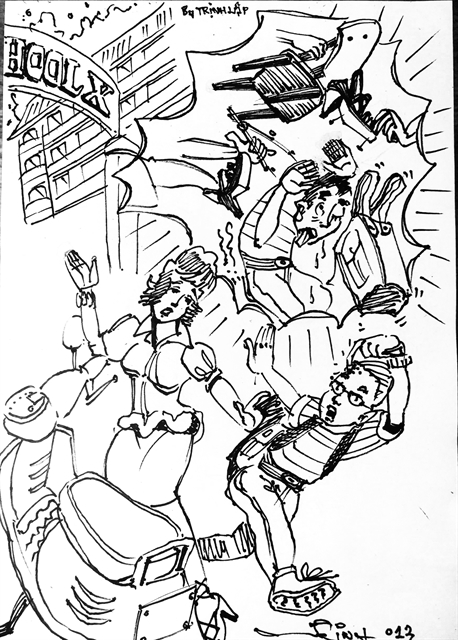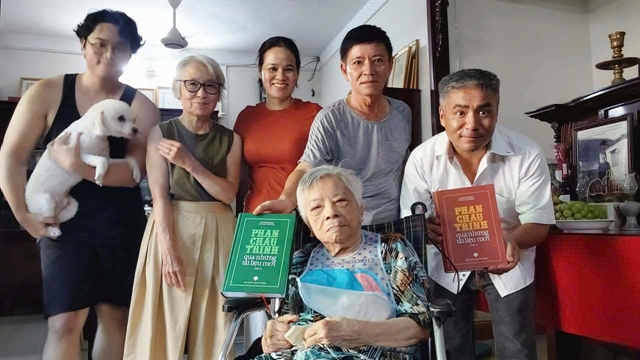 Talk Around Town
Talk Around Town


|
| Illustration by Trịnh Lập |
Nguyễn Lê Gia Linh
It is not wrong to say that we are living in an era of mental health revolution, a time when people thrive to prioritise their mental wellbeing. But it can be a challenge for victims of bullying to join this movement.
News in March about a bullied student in Vinh City committing suicide has sparked the question of whether bullying really poses threats to the victim’s mental wellbeing, or did the student overreact.
There were many comments who said that being bullied has nothing to do with mental health, and that the victims were being dramatic about the problem. Some even blamed them for their inability to tolerate such a “minor hardship”.
Reading those comments stirred my thoughts on how bullying heavily pressures its victims, mentally and physically, and how neglectful people are on this matter.
I have reached out to my friend Quỳnh Phương, who used to be a victim of bullying, to share her thoughts on the matter.
She says that as a person with OCD (obsessive compulsive disorder) and anxiety, the bullying exacerbated her mental disorders, and that she had to up-dose her medication while knowing it would be harmful to her physical health.
“Back then, it was really hard for me to speak up with my teacher or classmates. They barely cared about me. Things got better only when the bully went to study abroad.”
In my case, I was verbally bullied during my school years, ostracised and called “fat and ugly”. The repetition of harsh words back then manipulated me into having an identity crisis and struggling hard to find my self-value.
A friend of mine, Như Cát, 22, agrees with me, saying that “harmful words and/or actions can affect people and shape the way they think of themselves”.
Being bullied left some people with unmendable mental scars that run so deep that they are in complete darkness and can no longer fight back.
One of the most-asked questions to those victims is “Why don’t you guys reach out for help?”. But the people who ask that question typically do not consider that the answer is, “They have, but they only received backlash against themselves.”
In a society where mental wellbeing is still deemed as unnecessary, fighting for mental wellness is perceived as “dramatic” or “overreacting”. Sometimes, blaming others is easier than giving them a hand.
Being told that they are overreacting seriously belittles the victims, confuses them, and keeps them from sharing with others, making way for negative feelings to accumulate and reach the unbearable point.
“We are not in the position to judge those who took their own lives, or blame them for not trying otherwise. I think it is best for us to put ourselves in their shoes and show our condolences instead,” my friend Ánh Minh, 22, says.
I recently watched the South Korean drama series The Glory revolving around bullying and revenge, one of many pieces of media about this long-standing issue.
In the drama, high-school bullies put scorching-hot hair curlers on the protagonist’s body, beat her, and sexually assaulted her. No one was there to defend her, even her biological mother. She was so hopeless that she spent her adulthood planning and executing her revenge towards them.
It was scary to me, thinking how desperation could steer one’s life in a completely different direction.
“It makes me think about how some people either project in and harm themselves, and some do the opposite – project out and harm others,” says Cát.
When it comes to school bullying, it is hard to find the one to take responsibility aside from the bullies themselves. “Responsible” is relatively vague, as there has not been a protocol on anti-bully or any standard guideline on how to deal with the problem.
In the incident of the student who committed suicide, her school blamed the homeroom teacher while netizens blamed both the school and her parents. Regardless, had there been someone who actually tended to her, then it would not have gone that far.
“Suicides and self-harm can happen, but they are not supposed to,” Phương says.
But positive changes have been made thanks to the availability of online media channels like podcasts and videos which openly discuss mental wellness and bullying, making significant progress in informing the public on this matter, as well as suggesting possible solutions.
Several schools also now have talk shows or forums addressing bullying, showing the great effort of school officials in tackling the issue.
I am heartened to see several individuals stand up for themselves and share their stories, breaking the wall of fear and silence in victims, showing them that their situation is not unique to them.
Cát says that in addition to spreading awareness, it is necessary to have schools adopt policies to prevent and address all acts of bullying, improve their rules regarding bullying like what is and is not considered bullying, or how a victim reports or how to report a bully as a third party, train teachers, and have a consultant or psychologist.
Needless to say, self-harming, suicide, or any negative acts are not the solution. For problems like this, we cannot rely on the victims to sort out themselves, but rather, we must change society’s outlook on the problem. VNS

_med.jpg)


